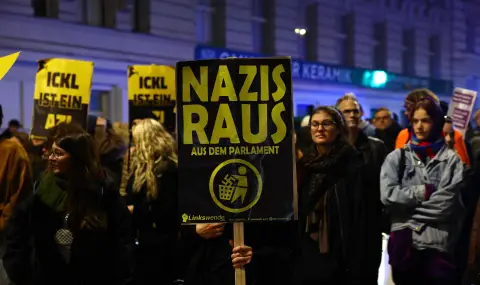Following his historic victory in parliamentary elections the far-right "Austrian Freedom Party" (APS) found itself in isolation, and somewhat at the mercy of its powerful critic – the president, who must oversee efforts to form a viable coalition government, BTA wrote, citing "Reuters".
The Eurosceptic and Russia-friendly APS won the vote for the first time, but its share of the vote was 29 percent, not enough to have a majority in parliament. To govern, she needs a coalition partner, and the leaders of the other parties say they are not interested in working with her.
President Alexander van der Bellen, an 80-year-old former leader of the left-wing "Greens" party, last year expressed his reservations about the APS because it did not condemn Russia's invasion of Ukraine and opposed sanctions against Moscow.
He also hinted that he might not allow 55-year-old APS leader Herbert Kickle to become chancellor. Kickel called on Van der Bellen to stick to established practice and give the party that came first in the election a mandate to try to form a government. But Van der Bellen stated that there is no such obligation, with which constitutional law experts also agreed.
On Sunday evening, he made an address in which he asked the parties to consult with each other and said the "pillars of liberal democracy" should be respected, listing the rule of law, minority rights, media independence and membership of EU.
These are all points that, according to Kickle's opponents, he and his party are working to undermine. Kickle says that the APS is the only true defender of Austrian sovereignty and neutrality.
SIGNAL
"This was of course a signal, but it could have two different meanings,", says Kathryn Steiner-Hemmerle, a professor of political science at the Carinthia University of Applied Sciences, regarding what Van der Bellen said.
"On the one hand, the APS should not be allowed to rule. I don't think he wanted to go that far… But of course this could also mean something else: "There are things I want to be included in the (future) program of the government," explained Steiner-Hemmerle.
Van der Bellen's office did not immediately respond to a Reuters request for comment on his remarks, which also suggested the process of forming a coalition government could take longer than the two or three months Austrians are used to.
In the first hours after the 2019 election, when the ruling conservatives won by a significantly larger margin, Van der Bellen said that "naturally" will give the first-placed party a mandate to try to form a coalition. He did so eight days later.
But this time the president gave no such direction and said that a party that does not have a majority "must convince the others – the other potential ruling parties as well as the head of state" that he wants to form a government, emphasizing his central role.
Kikkel said on Sunday that Van der Bellen should take into account the fact that APS qualified first. "The Constitution is not based on the principle of arbitrariness, but on the balance of forces," he noted.
If Kickle fails to find a partner to work with, it could open up a coalition of more moderate parties.
The APS, which was founded in the 1950s under the leadership of a former Nazi lawmaker, has made efforts to build a more moderate image. Like the rising far-right in some other EU countries, voters were drawn to APS promises to curb immigration and tackle the crisis caused by rising living costs.
